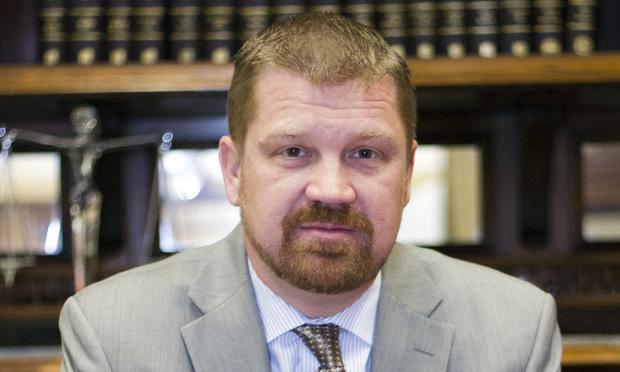How the 'Ground Zero' Case Against USA Gymnastics Finally Ended in Georgia
Here's how a settlement came about in the "ground zero" lawsuit that launched a national conversation about sexual abuse of children in training for Olympic sports.
May 04, 2018 at 04:26 PM
5 minute read

Following an unusual series of pretrial developments, a confidential settlement was reached for a South Georgia lawsuit against USA Gymnastics that will affect other such suits around the country, plaintiffs attorney Brian Cornwell told the Daily Report Friday.
Cornwell, of Cornwell & Stevens in Savannah, represented a former gymnast identified only as Jane Doe in an action against the Indianapolis-based national governing body for Olympic gymnastics and an ex-coach, William McCabe, who is now serving a 30-year sentence in a Fort Dix, New Jersey, federal prison for child sexual abuse in connection with another case.
Doe's lawsuit alleged that USA Gymnastics failed to protect her despite other warnings about the coach, who she claimed took secret video of her undressing in a changing room at his gym and published it on the internet when she was 11.
USA Gynmastics was represented by Michael Athans of Freeman Mathis & Gary in Atlanta. Both Athans and USA Gymnastics declined to comment for this story.
Cornwell said he has been working on the case for the past 12 years, starting when he lived and worked in South Carolina. After he moved to Savannah and became a member of the State Bar of Georgia in 2010, he began working on it with then-partner Jeffrey Lasky of Lasky Cooper.
Notably, the Doe case did not settle after its discovery materials sparked an Indianapolis Star investigation that ultimately brought 156 women to a Michigan courtroom in January to testify that they had been sexually abused by ex-Olympic team doctor Larry Nassar. (Cornwell called the Doe case “ground zero for the entire USA Gymnastics investigation.”)
Following the Nassar guilty plea, USA Gymnastics settled other lawsuits for confidential amounts. Yet the Georgia case continued toward an April 2018 trial date before Effingham County State Court Judge Ronald Thompson.
It was only after a five-hour pretrial hearing in March that Cornwell said he felt the tide turn.
“Our success against their motions in limine was a turning point in getting the case resolved,” Cornwell said. The judge didn't rule on the pretrial motions, but he gave an indication on which way he was leaning, according to Cornwell: Instead of deciding the motions, Thompson ordered a settlement conference and lined up a mediator through the Atlantic Judicial Circuit alternative dispute resolution service.
“Before we left, we had a rock solid settlement conference date,” Cornwell said. “The judge said we'll wait” on pretrial rulings, he added.
The settlement conference took an entire day, but by the time it was over, both sides had agreed to a figure, Cornwell said. They kept it quiet because the language of the settlement had to be approved. It took another month to finish the paperwork, transfer the money and dismiss the case.
“Honestly, the work's not done yet,” Cornwell said. “There are still hundreds, if not thousands, of victims in the state of Georgia that do not have any redress in these types of claims because of the Legislature's failure to pass the Hidden Predator Act.”
That legislation seeks to increase the filing period for lawsuits by survivors of childhood sexual abuse. The age requirement is now 23. Cornwell said the average age at disclosure for adult survivors of childhood sexual abuse is 42.
In the Jane Doe case, Cornwell said he waited as long as he could to file the lawsuit to allow his client to mature enough to withstand the trauma of a trial.
Cornwell said he would never have had a lawsuit to file if not for the efforts of Doe's mother. A key to the case was the claim that she made a phone call to USA Gymnastics when she first heard a rumor of issues with her daughter's coach. She called and asked if the organization had received complaints about him and was told there had been no complaints, which was not true, Cornwell said.
The law in Georgia and most other states still carries no civil remedy for failure to report allegations of child sexual abuse, Cornwell said. But this case stood out because, the suit alleged, the mother made that call and was given misleading information.
Later, when she discovered pornographic images on her daughter's computer—which she ultimately learned came from the coach—she reported them to USA Gymnastics, her daughter's school and the FBI, which is how she learned about the other complaints, Cornwell said.
She said she learned from an FBI agent that USA Gymnastics had a file of complaints about coaches, and that file became the subject of a discovery battle in the Georgia case and ultimately led to others across the country, including those against Nassar, when the material was unsealed.
Said Cornwell: “The mom's due diligence is what started this whole conversation.”
The case is Jane Doe v. USA Gymnastics, doing business as Savannah Metro Inc., and William McCabe, No. ST13CV058RT.
This content has been archived. It is available through our partners, LexisNexis® and Bloomberg Law.
To view this content, please continue to their sites.
Not a Lexis Subscriber?
Subscribe Now
Not a Bloomberg Law Subscriber?
Subscribe Now
NOT FOR REPRINT
© 2025 ALM Global, LLC, All Rights Reserved. Request academic re-use from www.copyright.com. All other uses, submit a request to [email protected]. For more information visit Asset & Logo Licensing.
You Might Like
View All

On The Move: Ex-Partner Returns to Lead Nelson Mullins Corporate Group, Burr & Forman Hires University GC as COO
5 minute read
Law Firm Sued for Telemarketing Calls to Customers on Do Not Call Registry

Evidence Explained: Prevailing Attorney Outlines Successful Defense in Inmate Death Case
Trending Stories
Who Got The Work
J. Brugh Lower of Gibbons has entered an appearance for industrial equipment supplier Devco Corporation in a pending trademark infringement lawsuit. The suit, accusing the defendant of selling knock-off Graco products, was filed Dec. 18 in New Jersey District Court by Rivkin Radler on behalf of Graco Inc. and Graco Minnesota. The case, assigned to U.S. District Judge Zahid N. Quraishi, is 3:24-cv-11294, Graco Inc. et al v. Devco Corporation.
Who Got The Work
Rebecca Maller-Stein and Kent A. Yalowitz of Arnold & Porter Kaye Scholer have entered their appearances for Hanaco Venture Capital and its executives, Lior Prosor and David Frankel, in a pending securities lawsuit. The action, filed on Dec. 24 in New York Southern District Court by Zell, Aron & Co. on behalf of Goldeneye Advisors, accuses the defendants of negligently and fraudulently managing the plaintiff's $1 million investment. The case, assigned to U.S. District Judge Vernon S. Broderick, is 1:24-cv-09918, Goldeneye Advisors, LLC v. Hanaco Venture Capital, Ltd. et al.
Who Got The Work
Attorneys from A&O Shearman has stepped in as defense counsel for Toronto-Dominion Bank and other defendants in a pending securities class action. The suit, filed Dec. 11 in New York Southern District Court by Bleichmar Fonti & Auld, accuses the defendants of concealing the bank's 'pervasive' deficiencies in regards to its compliance with the Bank Secrecy Act and the quality of its anti-money laundering controls. The case, assigned to U.S. District Judge Arun Subramanian, is 1:24-cv-09445, Gonzalez v. The Toronto-Dominion Bank et al.
Who Got The Work
Crown Castle International, a Pennsylvania company providing shared communications infrastructure, has turned to Luke D. Wolf of Gordon Rees Scully Mansukhani to fend off a pending breach-of-contract lawsuit. The court action, filed Nov. 25 in Michigan Eastern District Court by Hooper Hathaway PC on behalf of The Town Residences LLC, accuses Crown Castle of failing to transfer approximately $30,000 in utility payments from T-Mobile in breach of a roof-top lease and assignment agreement. The case, assigned to U.S. District Judge Susan K. Declercq, is 2:24-cv-13131, The Town Residences LLC v. T-Mobile US, Inc. et al.
Who Got The Work
Wilfred P. Coronato and Daniel M. Schwartz of McCarter & English have stepped in as defense counsel to Electrolux Home Products Inc. in a pending product liability lawsuit. The court action, filed Nov. 26 in New York Eastern District Court by Poulos Lopiccolo PC and Nagel Rice LLP on behalf of David Stern, alleges that the defendant's refrigerators’ drawers and shelving repeatedly break and fall apart within months after purchase. The case, assigned to U.S. District Judge Joan M. Azrack, is 2:24-cv-08204, Stern v. Electrolux Home Products, Inc.
Featured Firms
Law Offices of Gary Martin Hays & Associates, P.C.
(470) 294-1674
Law Offices of Mark E. Salomone
(857) 444-6468
Smith & Hassler
(713) 739-1250






